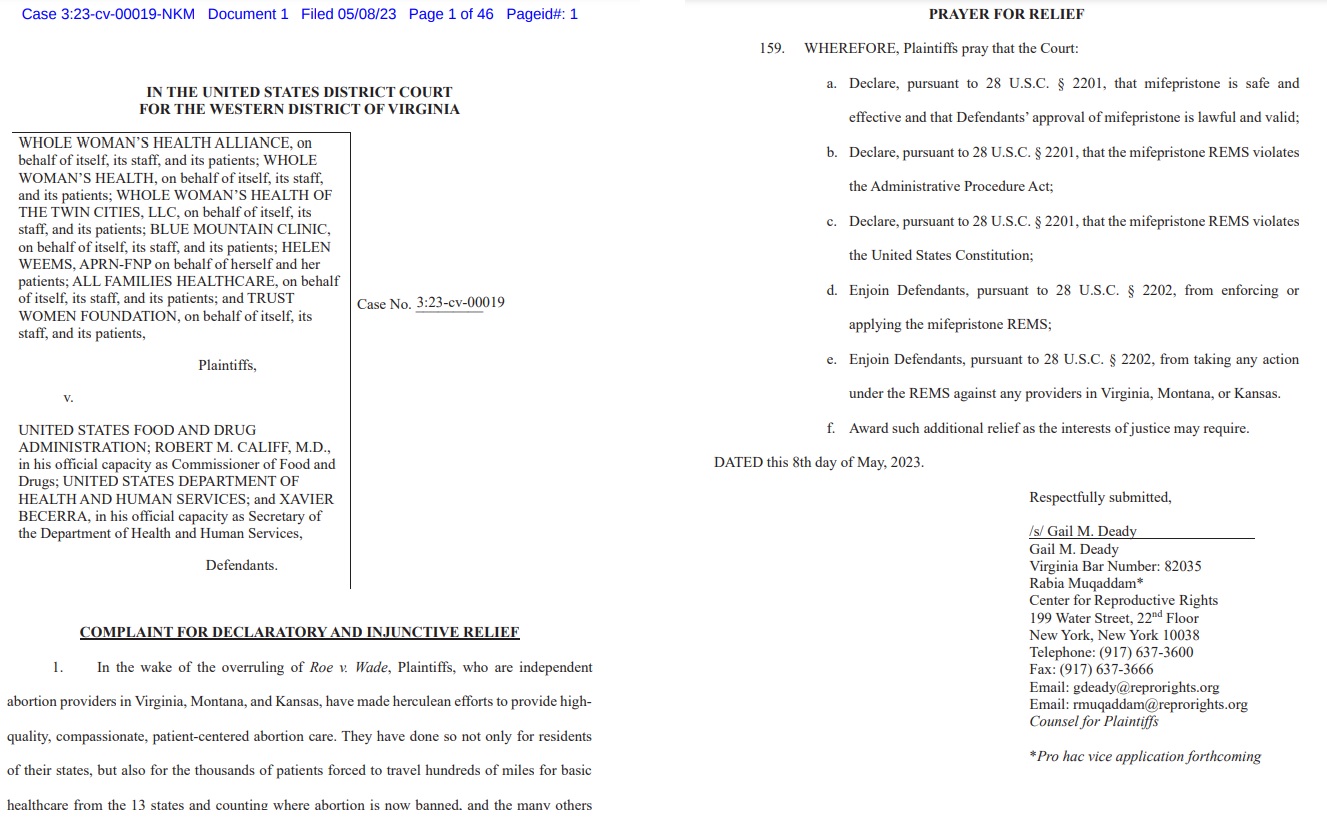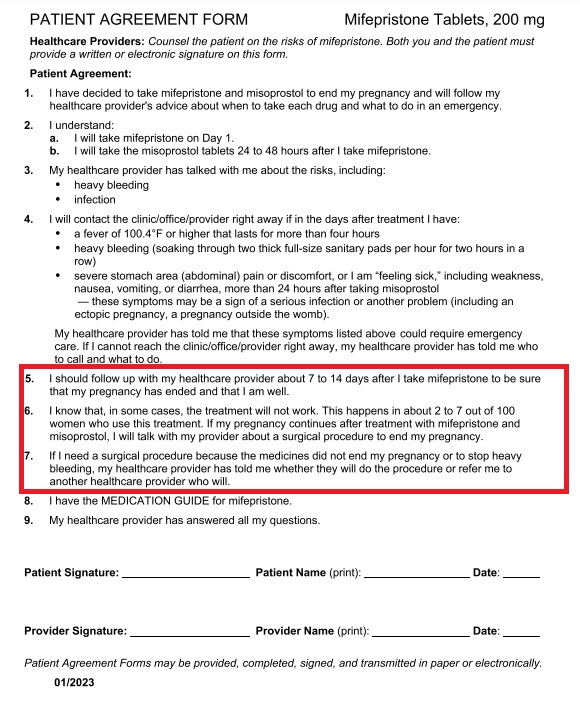Whole Woman’s Health Alliance (WWHA) has filed a lawsuit against the U.S. Food and Drug Administration (FDA) requesting “declaratory and injunctive relief” and asking the District Court for the Western District of Virginia to order the FDA to remove the abortion pill from under REMS safety requirements due to “chaos surrounding mifepristone.”
The lawsuit also asked the court to enjoin the government agency from “altering the availability of mifepristone under the January 2023 REMS, to ensure some modicum of certainty and continued patient access to a safe, effective medication that has been repeatedly targeted simply because of its association with abortion.” In addition, the lawsuit is asking the Court to “[e]njoin Defendants… from taking any action under the REMS against any providers in Virginia, Montana, or Kansas.”

Whole Woman’s Health Alliance (WWHA) v FDA mifepristone abortion pill lawsuit
WWH lawsuit follows additional court cases
Whole Woman’s Health Alliance’s (WWHA) lawsuit follows a case filed by GenBioPro (GBP), the generic abortion pill manufacturer, before the U.S. District Court for Maryland. GenBioPro is asking the court to preemptively block the FDA from ‘upending’ the generic abortion pill company’s 2019 approval to distribute mifepristone.
It also follows Alliance for Hippocratic Medicine (AHM) v. FDA as well as Washington State v. FDA — surrounding legitimacy of the FDA’s approval process of the drug.
The AHM lawsuit centers on a ruling by U.S. District Court Judge Matthew J. Kacsmaryk which suspended the FDA’s 2000 approval of the abortion pill mifepristone, and all decisions made thereafter. The case was appealed but a temporary stay has been issued by the Supreme Court until the case can be heard before the full Fifth Circuit Court later this month.
The Washington State lawsuit, filed by pro-abortion plaintiffs and impacting a handful of states, is also requesting that the Court remove the abortion pill from the FDA’s REMS safety system. However, before hearing the merits of the full request, U.S. District Judge Thomas O. Rice granted a preliminary injunction to bar the FDA from “altering the status quo and rights as it relates to the availability of Mifepristone under the current operative January 2023 Risk Evaluation and Mitigation Strategy under 21 U.S.C. § 355-1 in Plaintiff States.”
The conflicting lawsuits prompted WWHA to write, “Plaintiffs—independent abortion providers with limited resources in hostile states—are caught in the middle of this maelstrom. They provide care in states that are party to neither case and are thus in a particularly precarious and uncertain position.”
“There is no reason that providers at Plaintiffs’ clinics, who are not party to the Washington case, should have to be subject to these same risks from being certified prescribers,” WWHA added.
WWHA targets the FDA REMS
Whole Woman’s Health Alliance (WWHA) claimed that the FDA “has overregulated mifepristone in ways that are unjustified and discriminatory.” They called the FDA’s decision to place the dangerous drug under its REMS safety requirement “irrational” despite the fact that the REMS is used on a limited number of drugs which need additional monitoring.
“From the very beginning, FDA has overregulated mifepristone in ways that are unjustified and discriminatory… These restrictions are already irrational, but in light of the recent chaos surrounding mifepristone, they have also become intolerable and incompatible with Plaintiffs’ ability to meet the needs of their patients,” the lawsuit claimed.
“A ‘Risk Evaluation and Mitigation Strategy’ (‘REMS’) is an unusual overlay of requirements, far outside of the norm, that FDA can choose to impose only when ‘necessary to ensure that the benefits of the drug outweigh the risks of the drug,'” WWHA wrote, failing to mention that the drug was placed under the REMS following a number of deaths.
“The most burdensome type of REMS is ‘Elements to Assure Safe Use’ (‘ETASU’), which FDA imposes only if medically necessary due to a drug’s ‘inherent toxicity or potential harmfulness,'” the lawsuit added.
“FDA reevaluated the provisions of the mifepristone REMS in 2016, and again in 2019, 2021, and 2023, but it has continually decided to reimpose the REMS despite longstanding objections from the medical community and its own review of the data showing mifepristone’s safety and efficacy,” WWHA claimed.
The lawsuit bemoans the possibility that the REMS could be returned to a pre-2016 status should the decision in the AHM lawsuit be upheld in full or in part. This would allow for only in-person dispensing of the deadly drug regimen and eliminate the profitable virtual, mail order and pharmacy dispensing of the drug.
“First, reinstating the physician-only requirement for certified prescribers retracts the pool of qualified mifepristone providers. And it does so after years of incremental progress to build a network of advanced practice clinicians (including nurse practitioners, nurse midwives, and physician assistants) with the training and experience to provide this critical care,” WWHA wrote in its lawsuit.
“Second, reinstating the REMS requirement that mifepristone be dispensed only in a clinic, medical office, or hospital—and not via mail order pharmacy—will eliminate abortion access for the large number of patients who have come to rely on direct to patient telehealth services, and destroy Plaintiffs’ virtual care models for mifepristone,” the lawsuit added.
WWHA then called the required patient agreement “useless,” suggesting that signing the form harmed women experiencing a miscarriage by “requiring them to make a false and potentially traumatizing attestation that they are ‘decid[ing]’ to ‘end [their] pregnancy’ when they are experiencing a pregnancy loss.” And yet, the abortion industry has made multiple efforts to conflate abortion (direct and intentional killing) and miscarriage (accidental and unintentional death) as no different.
WWHA also claimed the patient agreement, which has never had a privacy breach, would put abortion providers at potential risk by identifying “the provider to people who have access to the patient record, potentially including, for example, a patient’s spouse, partner, or parent,” which could expose “providers and patients to threats of reprisal, especially in today’s climate of hostility to abortion.”

Mifepristone Patient Agreement Form for abortion pill
WWHA’s lawsuit makes it clear that the goal is to demedicalize and expand access to abortion: “Simply put, the 2023 REMS retains unnecessary and harmful dispensing and prescribing requirements that threaten patient and provider privacy and continue to put mifepristone out of reach despite its exemplary safety record. As one recent study of clinicians and administrators put it, although mifepristone is safe and effective, the REMS are the ‘linchpin of a cycle of stigmatization that continues to keep mifepristone out of primary care practice.'”
WWHA claims abortion is ‘safe’ but pregnancy isn’t
Whole Woman’s Health Alliance (WWHA) and the other abortion plaintiffs extolled the alleged “safety” of mifepristone but pointed to pregnancy in general as stressful and often dangerous.
“Each day a person remains pregnant means they continue to experience the symptoms, risks, and potential complications of pregnancy. Pregnancy—even when uncomplicated—stresses the body, causes physiological and anatomical changes, and affects every organ system,” WWHA lawsuit stated.
“People who continue their pregnancies and give birth face significant risk in the United States—in large part as a result of systemic discrimination and inequitable access to healthcare. Pregnancy also has potentially long-term physical, emotional, and mental effects on a person who goes through childbirth, sometimes persisting well after birth,” the lawsuit added.
The lawsuit then went on to cite the debunked Turnaway Study: “Forced pregnancy and childbearing also have long-term impacts on a person’s educational and economic futures, and their ability to shape their lives. People who are denied a wanted abortion are more likely to experience economic insecurity and raise their existing children in poverty. The financial impacts of being denied an abortion are as large as or larger than being evicted, losing health insurance, or being hospitalized.”
“For people who remain pregnant—or need care at some point during a pregnancy— there are also dwindling options. Counties in more than one-third of the country are maternity care deserts, without obstetric providers, birth centers, or labor and delivery hospitals,” WWHA claimed.
“The only actors who have ever attempted to suggest that mifepristone is unsafe are anti-abortion ideologues who ignore the conclusions of the AMA, ACOG, and every other mainstream medical and public health organization to have addressed the issue,” the lawsuit claimed.
However, these organizations are hardly “mainstream” given that they openly advocate for abortion, even granting cover to Big Abortion.
Plaintiffs in the lawsuit
Whole Woman’s Health Alliance (WWHA) is owned by Amy Hagstrom-Miller and operates multiple abortion facilities in several states, including Virginia, which commit abortion up to 16 weeks of pregnancy. In addition, WWHA operates a virtual abortion dispensary “that provides telehealth services for medication abortion in Virginia, Maryland, Minnesota, New Mexico, and Illinois,” the lawsuit claimed.
Interestingly, former WWHA board member Dr. Daniel Grossman was a principal investigator of abortion pill clinical trials and author of several studies — something WWHA failed to mention in their lawsuit.
Our board member @DrDGrossman, an abortion provider, put this perfectly.
"The question is whether we’re able to show empathy for the patient making that decision."https://t.co/HvMUYLEkY3
— Whole Woman’s Health Alliance (@WWHAlliance) February 5, 2019
Additional plaintiffs listed on the lawsuit include Blue Mountain Clinic in Montana, which commits abortions up to 21.6 weeks; nurse practitioner Helen Weems, owner of the All Families Healthcare in Montana which commits abortions up to 12.6 weeks; and Trust Women abortion facility in Kansas and Oklahoma, which commits abortion up to 21.6 weeks.







